Understanding Postpartum Menstrual Health
Bringing a baby into the world comes with lots of fun surprises, but many women aren’t prepared for how their menstrual cycle will change after pregnancy. Your first postpartum period after can be irregular, heavier, more painful, or delayed—especially if you’re breastfeeding.
For some, menstruation after giving birth is just a temporary inconvenience, but for others, it’s a sign of deeper hormonal imbalances. If your first postpartum period is painful, prolonged, or irregular, it may be due to underlying issues like nutrient deficiencies, high stress levels, or hormone imbalances that need to be addressed.
The good news is that you don’t have to suffer through heavy, painful periods after childbirth. With the right nutrition, supplements, and lab testing, you can regulate your menstrual cycle and avoid unnecessary discomfort.
What to Expect From Your First Period After Pregnancy
Many new moms wonder: When do you get your period after giving birth when breastfeeding? The answer varies.
Your first period can return as early as six weeks postpartum or as late as a year or more, depending on individual factors like breastfeeding and hormone balance.
Lochia vs. Your First Postpartum Period
Before your first true period, you’ll experience lochia, which is postpartum bleeding that lasts anywhere from two to six weeks after childbirth. This bleeding is your body’s way of shedding the extra blood, mucus, and tissue from pregnancy.
Lochia is not a period, but it can feel like one, with heavy bleeding at first that gradually tapers off. If bleeding suddenly increases or you pass large clots, consult a doctor to rule out postpartum hemorrhage.
When Will My Period Return After Giving Birth?
- If you’re not breastfeeding: Your period may return 6-12 weeks postpartum as your body begins to regulate estrogen and progesterone levels.
- If you’re breastfeeding: Your period may be delayed for several months or even a year, depending on how often you nurse. The hormone prolactin, which supports milk production, suppresses ovulation and menstruation.
- If you combo-feed (breastfeeding + formula): Your period may return within 3-6 months postpartum as milk supply decreases.
Keep in mind that you can still get pregnant before your period returns because ovulation happens before menstruation. If you’re not ready for another pregnancy, take preventative measures!
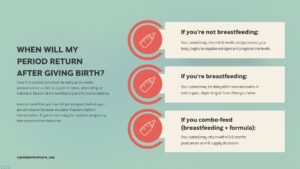
How Will My First Period After Pregnancy Be Different?
If you’re wondering what your first postpartum period will be like, expect it to be different from your pre-pregnancy cycle.
- Heavier bleeding – Your first few periods after birth may be heavier due to extra uterine lining buildup.
- More intense cramping – The uterus continues shrinking postpartum, which can lead to stronger contractions and period pain.
- Irregular cycles – It can take up to a year for your cycle to regulate.
- Longer duration – Some women ask, “How long will the first postpartum period last?” The answer is often 7-10 days, which is longer than a typical period.
- Hormonal shifts – Estrogen dominance and low progesterone can contribute to PMS, mood swings, and unpredictable cycles.
If your first postpartum period lasts longer than 10 days or is excessively heavy, consult your doctor.
Why Do Postpartum Periods Become Heavy or Painful?
Your body is still recovering from pregnancy, and various factors contribute to heavy, painful periods postpartum.
1. Hormonal Imbalance
Your body undergoes massive hormone shifts after pregnancy. Estrogen and progesterone, which were at their peak during pregnancy, drop sharply after birth. If progesterone remains low while estrogen stays high (estrogen dominance), you may experience:
- Heavy periods
- Severe cramping
- Mood swings
- Breast tenderness
High cortisol (the stress hormone) also plays a role in disrupting your menstrual cycle, leading to irregular periods.
2. Postpartum Inflammation & Uterine Healing
Inflammation is a normal part of postpartum healing, but chronic inflammation can prolong menstrual irregularities. Elevated cortisol and estrogen levels can make inflammation worse, leading to:
- Increased period pain
- Fatigue and bloating
- Prolonged bleeding
Regulating your menstrual cycle postpartum isn’t just about waiting for your body to adjust—it’s about actively supporting hormone balance and reducing inflammation.
3. Nutrient Deficiencies
Pregnancy and breastfeeding can deplete key nutrients essential for hormone regulation. Low levels of magnesium, iron, and B vitamins can worsen postpartum period symptoms.
- Magnesium postpartum benefits – Helps relax muscles, reduce cramps, and support progesterone production.
- Iron – Prevents anemia, which can worsen fatigue and heavy periods.
- Omega-3s – Reduce inflammation and regulate mood swings.
How to Regulate Your Menstrual Cycle & Prevent Painful Periods
As if the after pains from delivery weren’t enough to endure, some women may experience excess cramping during their menstrual cycle.
If your period is irregular, painful, or heavier than usual, you don’t have to suffer through it. Here’s how you can naturally balance your hormones and regulate your cycle:
1. Support Progesterone Levels
- Take magnesium glycinate postpartum to support progesterone and reduce PMS symptoms.
- Include healthy fats like avocados, salmon, and flaxseeds to promote hormone production.
2. Balance Estrogen Levels
- Avoid inflammatory foods like refined sugar and processed grains.
- Eat cruciferous vegetables (broccoli, cauliflower, kale) to detox excess estrogen.
- Stay hydrated to help your body flush out excess hormones.
3. Reduce Stress & Support Cortisol Regulation
- Prioritize sleep (even if broken, quality sleep helps regulate hormones).
- Practice mindfulness (meditation, deep breathing, or short walks).
- Exercise gently (avoid high-intensity workouts that spike cortisol).
4. Optimize Postpartum Nutrition
- Eat iron-rich foods (grass-fed beef, spinach, lentils) to restore blood levels.
- Take a high-quality postpartum supplement to fill in nutrient gaps.
Postpartum Lab Testing: The Key to Personalized Treatment
Every woman’s postpartum experience is different. If you’re struggling with:
- Heavy, painful periods
- Irregular cycles
- Fatigue and mood swings
…it may be time for postpartum lab testing to get to the root cause.
At Postpartum Care USA, we provide comprehensive hormone and nutrient testing to create a personalized postpartum plan tailored to your body’s needs.
Through advanced lab work, we can determine:
- Estrogen-to-progesterone ratio (to identify imbalances)
- Cortisol levels (to see if stress is affecting your cycle)
- Vitamin & mineral deficiencies (to support overall recovery)
When to See a Doctor About Your Postpartum Period
While irregular periods are common postpartum, certain symptoms should be checked by a healthcare provider:
- Soaking through one pad per hour
- Periods lasting longer than 10 days
- Large blood clots (bigger than a quarter)
- Severe pain that interferes with daily life
Your Period Doesn’t Have to Be Miserable
Your menstrual cycle is a key indicator of your overall health. If you’re struggling with irregular, painful, or heavy postpartum periods, it’s not something you have to live with.
Balancing your hormones naturally through nutrition, supplements, and lab testing can help regulate your cycle, ease period pain, and support a smoother recovery.
If you’re ready to get your cycle back on track, schedule a consultation with Postpartum Care USA today and start feeling better faster.
Pin This for Later:
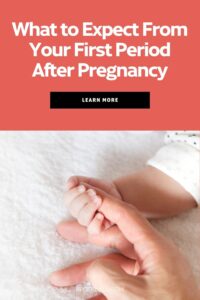
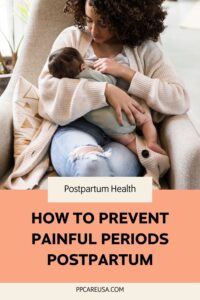
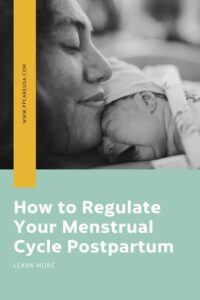
Postnatal Depletion
Meet the Team
Our Services
Supplements
A virtual healthcare clinic that helps postpartum mamas recover from postnatal depletion syndrome with a holistic approach.
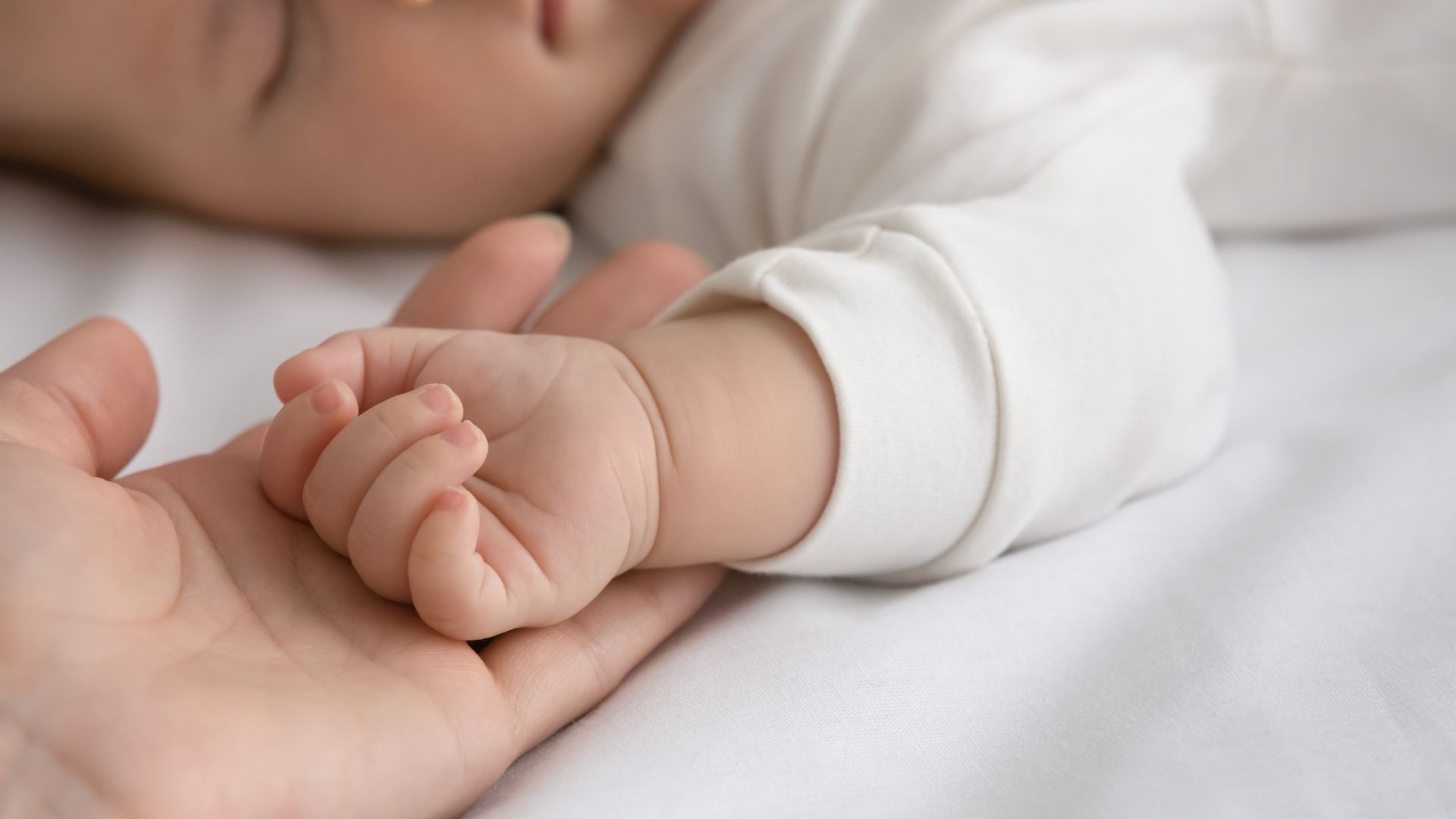
Get in touch